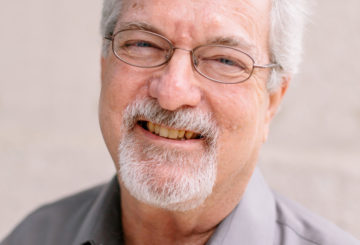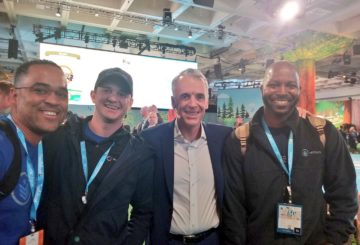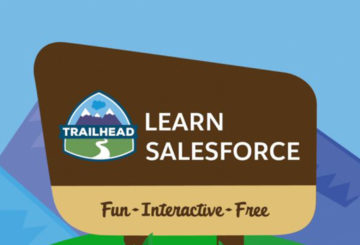As we celebrate 10 years of Merivis, we’re spotlighting the incredible alumni who have shaped our community and gone on to lead impactful careers. In this special “Where Are They Now” feature, we catch up with Robyn Provost to hear how her Merivis journey has influenced her growth and where she is today. Learn more about our 10-year celebration and how we’re honoring our alumni, volunteers, and partners here.
How has your career evolved since graduating from Merivis, and what are you working on now?
Since graduating from Merivis, my career has evolved from grassroots CRM management to strategic consulting at the federal level. I began my Salesforce journey in 2015 as an accidental admin for a state agency, blending public service with emerging tech. After pivoting into consulting with global firms, I deepened my expertise across public and private sectors – supporting Salesforce initiatives in entertainment, financial services, automotive and real estate. Today, I serve as a Senior Solution Consultant at Salesforce, supporting transformational projects across federal agencies. I lead business analysis efforts and ensure alignment with federal compliance standards. I also achieved formal education in Analytics, which has shaped my approach to data governance, performance measurement, and strategic forecasting. Looking ahead, I’m deeply invested in the potential of AgentForce. I see it as a strategic enabler for federal teams to leverage agentic AI to enhance triage, streamline case management, and foster proactive insight generation. My aspiration is to align AgentForce with governance models and SLA protocols that demonstrates how AI can elevate collaboration, drive transparency, and support mission-critical outcomes. It’s important to me that we’re not simply deploying AI, but intentionally designing systems with resiliency and clarity that resonate with the public good and uphold the trust placed in federal institutions.
What role did the Merivis community play in your professional growth and confidence in tech?
Merivis was a catalyst. It gave me the confidence to own my technical journey and the community to back it up. Coming from a military and public service background, I didn’t always see myself as ‘tech forward‘, but Merivis helped me reframe that narrative. It validated my skills, introduced me to peers who shared my path, and gave me the tools to thrive in consulting environments. That support was instrumental in my transition to consulting and ultimately to Salesforce itself.
How do you stay connected or give back to Merivis as an alum?
I stay connected by informally mentoring others and sharing my story – especially with those navigating career pivots or entering tech from nontraditional backgrounds. I also advocate for Merivis in professional spaces, highlighting its impact on workforce development and veteran empowerment. Aspirationally, I’d love to contribute more formally – perhaps by leading a workshop on business analysis in the public sector or helping design onboarding materials that bridge military experience with Salesforce fluency.
Merivis is a force multiplier. It doesn’t just train talent – it cultivates leaders. By equipping veterans and spouses with Salesforce skills and community support, Merivis injects resilience, strategic thinking, and mission-driven values into the tech ecosystem. As AI continues to evolve from predictive analytics to agentic systems capable of autonomous decision-making, the need for diverse voices becomes more urgent. Merivis helps diversify the ecosystem with professionals who understand service, structure and impact – stewards of accountability, empathy, and operational excellence. These leaders go on to shape consulting firms, government agencies, and enterprise platforms as architects of change because they have a deep understanding of chain of command, the importance of clear protocols, and the gravity of decisions that affect real lives. That kind of lived experience is essential when designing ethical AI systems that serve the public good.
What would you say to the Merivis team, partners, and supporters as we celebrate 10 years of impact?
To the Merivis team, partners, and supporters: thank you for building a legacy of transformation. You’ve empowered thousands to rewrite their career stories and step into tech with confidence and purpose. Your work has ripple effects across industries, agencies, and communities. As we celebrate 10 years, know that your impact is exponential and deeply personal. I’m proud to be a part of this journey, and I look forward to the next decade of innovation, inclusion, and leadership.
Original Interview below
Why did you join the military?
I was 19 years old, working at a local pizza shop in my hometown of San Bernardino, CA, when I had an epiphany about where my life would go. I went from having a track record for a promising future up to dropping out of two colleges by this time. This caused my relationship with my parents to spiral downwards, and for a while I had no contact with my family. I was flunking college because my priorities were everywhere but school—I held 2-3 jobs at a time and attended school less and less to make ends meet. I knew had I continued down that path, the outcome wouldn’t be so great, so I joined the Navy for the opportunity to do better.
What was your role and your responsibilities while you were serving?
I was an AZ – Aviation Logistics and maintained logs and records for E2C aircrafts. I was also trained to manage technical publications as a tech librarian and worked with various databases to track and maintain records.
What are you most proud of?
I am proud of my academic achievements. Despite some of the challenges with college from my earlier years, I returned to college at the age of 27. I took baby steps and attended the local community college here in Austin and fast forward to today—I have earned 2.5 master’s degrees. My latest accomplishment is a Master’s in Analytics from Texas A&M—Gig ’em!
Looking back, I am not sure how I did it. My husband was working as a contractor in the Middle East, and our son was so young. He used to accompany me to class because we don’t have family here in Austin. My husband eventually went back to school, too, and earned a master’s in Nursing from UT. We are both the first ones in our families to have attained higher education.
What is the one thing you miss about your time in the military?
I miss the camaraderie. I never felt like I didn’t belong or was not welcomed and it was the type of “family” where everyone had their unique traits, issues, challenges, what have you—and collectively we were one and the same. I am grateful to have met folks that I still keep in touch with to this day and know that I can call on for anything.
Where did you grow up, what kind of family did you come from?
I grew up in Southern California, South Central Los Angeles and San Bernardino. I am the eldest of four; my parents migrated to America from Cambodia as refugees of the Khmer Rouge regime in 1980. We don’t have any family here, so I never had the traditional structure for an extended family. My dad lost his brothers and mother in the regime—they were executed by the Khmer Rouge because of their profession.
Growing up, my dad was always big on education. He was a linguist in the Khmer Republic Army, and when the Khmer Rouge took over Cambodia, he had to deny his profession to survive. Being educated, or simply wearing glasses, or being light-skinned, got you killed. It’s crazy to think that if I were to be alive during that time, I’d be executed because I wear glasses!
After high school, I went through a rebellion phase—hence college issues. I had bicultural issues. Outside the home, I was American; at home, I wore a sarong and spoke Khmer. I began to realize why my dad was always so hard on us with school as I got older and have a kid of my own. It was the lack of education that killed 4 to 5 million people in his country, and he was trying to preserve what little of his culture, his pride, his love for his country through his children.
He valued higher education so much that my official rites of passage did not occur until the night before I walked the stage for my first master’s degree, an MBA at 32 years old. After our family dinner, he poured me a shot of cognac for the first time ever, and he shared with me the grueling details of his capture by the Khmer Rouge and how he managed to escape being executed. That was a defining moment for me as a Khmer woman and daughter.
What challenges or blessings stand out from your history?
I grew up poor. My parents held odd jobs such as sewing in sweatshops to make ends meet, and we hardly had money for things—even school supplies. We used to have typing exams in the fourth grade, and I did poorly every time. I asked my teacher to print out a keyboard for me because we did not have a typewriter or computer at home to practice. My teacher provided a laminated QWERTY keyboard printout, and I took that sheet home and practiced for hours. I remember my mother used to send me outside, scolding me that the nubs of my fingers banging on the table would wake up my baby sister. So I’d practiced in our gravel driveway until the laminated printout was no longer crisp. One year I turned a science project with my paper “glued” to the board with jasmine rice because we didn’t have glue. So now, whenever there’s a back to school sale, I go berserk, buy so many supplies and send my son to school with extra.
How did you find Merivis? What about the program made you join?
I was handed the keys to the kingdom as the accidental admin for Salesforce in 2015. I had zero knowledge about Salesforce at that time—CRM, who?! I did what one would do if they were assigned a new and unfamiliar task, I Googled about it. Link after link, I discovered Salesforce communities, and I posted a question—maybe something to the effect of a help call, Mayday, Mayday! Help! What is Salesforce?!?! Hector was the first to respond to my call for help. We later met up for coffee and he showed me the ropes. That’s how I got connected with Girly Geeks (now WIT), attended the first Salesforce Saturday in Austin with the wonderful Stephanie Herrera, and learned about Merivis and Vetforce.
What is your #MerivisMoment?
My fave moment with Merivis was the onsite training. I was with the 2nd cohort. I remember being so nervous and feeling so incompetent. But we had a great instructor and a great panel of board members who were genuinely vested in our development. And there were other vets and spouses who were also new to Salesforce just like me; we were learning together. Life took me in a different direction, and I was less engaged with the Salesforce community from 2016 to 2018; when I decided to take the leap and pivot my career into Salesforce, Merivis was with me every step of the way for this transition. My fave part is that everything’s come full circle, and I am in the position to grow with others who were once in my shoes and give back.
What are your career goals now that you are Salesforce certified?
My immediate goals are to get certified in Sales and Service Cloud and take it from there. I really need to get out of my own way and just learn to be a little more technical. I am currently working through that.
What is one skill or value military and/or military spouses have that would benefit a hiring organization?
We’re self-starters and professional navigators. Tell us what’s your goal, show us how you want us to do it, and we’ll develop a roadmap from there. We have a vast bank of experiences that we can leverage. At 19 years old, I had been trained in aviation logs and records and how to maintain confidential resources for a fleet of aircraft—I can only imaging what my experience bank would look like if I had served a longer term or retired.
Sum up your Merivis experience in just one word.
Pivotal.
If you could give one piece of advice to new students going through the Merivis program, what would that be?
Trust the process!
How has your life and/or career changed as a result of the Merivis program, resources and community?
I currently consult within Salesforce at one of the biggest consulting firms in the world. A year ago, if you told me that I’d be doing this, I laugh and call you crazy. Initially, I was scared to make the transition into a new career, but Merivis and Vetforce were in my corner the entire time: encouraging me; cheering me on by way of providing access to training and learning resources, mentors and coaches for career development; and sustaining a network platform that syncs veterans from all corners of the world together.
What’s something that you get out of Merivis that you don’t find anywhere else?
Who can ping the CEO, board members and members (veterans and milspouses) of an active organization and get a response back in a timely manner? I’ve gotten that with Merivis. The night before my interview with the firm that I am with now, one of the board members stayed up until 11pm on a virtual call to prepare me for the next day—we ran through several case studies for a good hour or so. That helped shave off some of my nervousness. I am very grateful for that!
A lot of people talk about community when we talk to them about Merivis. What do you like about the Merivis community?
When you know a Merivis alum, you also know their family. It’s more than just a veteran-to-veteran connection, I have Merivis colleagues who I hang out with outside of Merivis and contact frequently. I think that goes back to how connected military communities are—I can see that emulated here.
How would you describe the people you’ve connected to through Merivis?
The folks that I’ve met are down to earth and genuinely kindhearted, I haven’t felt normal or myself around a group of people in a very long time, and they really want to see you succeed! They are inspiring—everyone I’ve met come from backgrounds and have experiences that just amaze you. They are extremely helpful and always willing to lend a helping hand; when you have a question or are stuck on something, chances are a Merivet has been there, done that and will share with you their story. Accountability is also built into our network—we’re all in this for a number of reasons, but the one thing that binds us is our goal to elevate within our respective careers, so folks will eagerly celebrate your success (and failure) and keep you motivated until your next goal, and so on.
If you could add something to Merivis, what would it be?
Merivis Family Pack, because Merivis outreach impacts the entire family. I know for me it did. Merivis helped me to lay the foundation to transition into a new and rewarding career. The economic impact? I increased my salary more than half and no longer had to worry about how I was going to make one paycheck stretch for the month. It’s an incredible feeling when you have the means to provide for your family.
Connect with Merivis Graduate, Robyn Provost on Linkedin



